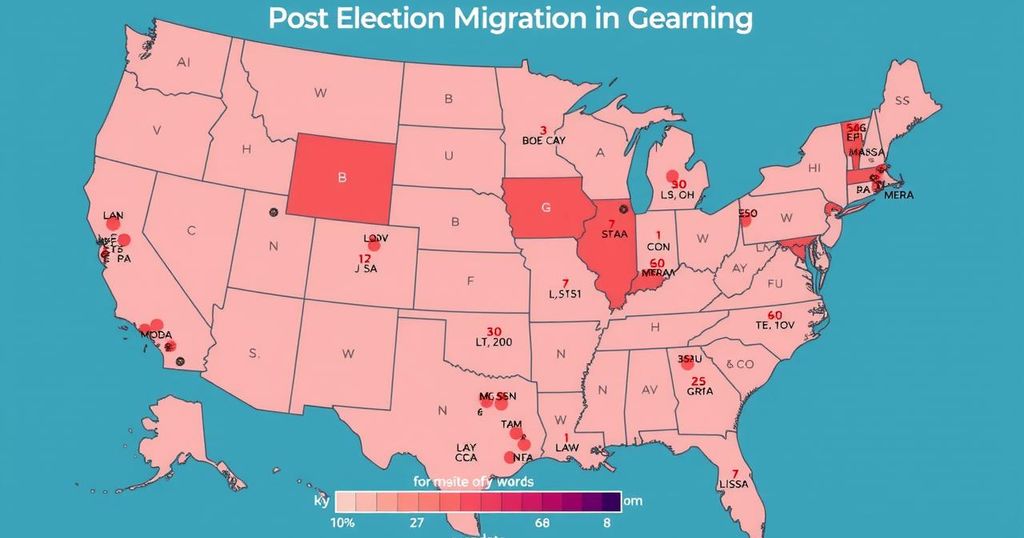Post-Election Migration Perspectives: Assessing Policy Implications

The 2024 presidential election has significantly altered public opinion on immigration, with 55% of Americans supporting reduced immigration—a stark increase from 28% in 2020. Factors influencing this shift include political rhetoric and humanitarian crises abroad. The right to asylum is often overshadowed by systemic backlogs. Urgent reform is necessary to address labor demands and family reunification amidst impending restrictive policies that may cause human suffering.
The implications of the 2024 presidential election on the United States’ national migration policy will unfold in subsequent months. A significant shift in public sentiment regarding migration has emerged over the last four years, with a Gallup poll illustrating that the proportion of Americans advocating for decreased immigration increased from 28 percent in 2020 to 55 percent in 2024, the highest since 2001. This change was influenced by several factors, particularly the rhetoric surrounding a purported “immigrant invasion,” despite the fact that the increase in migration was linked to crises in countries such as Venezuela and Central American nations.
International and domestic laws recognize the right to asylum, which mandates that individuals facing persecution in their home countries must be allowed to present their claims for protection. The influx of migrants seeking asylum has, however, overwhelmed the system, leading to a backlog that can delay reviews for up to five years. Although migrants receive some assistance and work authorization, misconceptions about the benefits provided have fueled opposition from anti-immigrant factions.
The transportation of migrants by Republican governors to major Democratic cities has sparked fresh public awareness, often grounded in misinformation. Concurrent crises in Haiti, Ukraine, and Afghanistan resulted in numerous migrants receiving Temporary Protected Status (TPS) and humanitarian parole, further complicating the migration narrative. This rapid influx has contributed to a critical reevaluation of public policy concerning immigration.
In democratic societies like the United States, the formation of public policy is complex and often swayed by prevailing public opinion rather than rigorous policy analysis. The victorious presidential candidate capitalized on the public’s confusion regarding migration issues, exaggerating the situation to galvanize support. The urgency for a comprehensive reform of the United States immigration system is evident, given the pressing demands for labor across various sectors and the need for family reunification.
Nevertheless, the prospects for substantial immigration reform appear bleak as the new administration prepares to implement stringent policies, including potential mass deportations and the termination of protections for undocumented minors. This impending change portends significant human suffering, the full extent of which remains to be seen. There is a pressing necessity to foster a deeper understanding of the migration crisis if we aim to assist affected individuals and influence our legislators towards enacting meaningful reforms reflective of our national values and needs.
The migration policy landscape has undergone a significant transformation influenced by the outcomes of the 2024 presidential election. Over the past four years, public opinion surrounding immigration in the United States has shifted dramatically, with increasing calls for reduced immigration rates. Several humanitarian crises around the world have compounded migration patterns, leading to heightened scrutiny and debate regarding migration policies. The intersection of public opinion, political rhetoric, and practical migration realities has created a volatile environment for policymaking in this critical area.
In conclusion, the 2024 presidential election has catalyzed a notable shift in public opinion regarding immigration, prominently marked by the rising sentiment against immigration. The right to asylum remains pivotal; however, the current system is burdened under backlogs and misconceptions. Without urgent reform to address labor shortages and facilitate family reunification, the immigration landscape will continue to reflect chaos and suffering. Legislative action must be taken to align immigration policies with national priorities and humanitarian principles, thereby fostering a more compassionate and efficient immigration system.
Original Source: www.miamiarch.org







